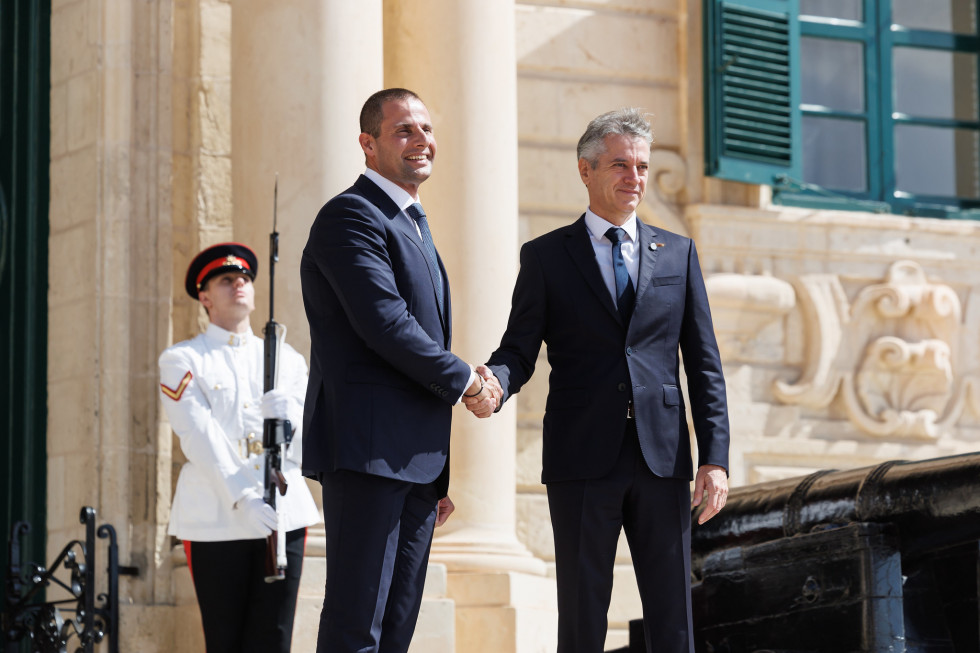The Prime Minister at the EUMED-9 Summit: "We stand united and will continue to do so in the future"

Prime Minister Robert Golob took part in the 10th summit of the heads of the EUMED-9 member states | Author Nebojša Tejić/STA
The nine heads of the states bordering the Mediterranean discussed the strengthening of cooperation with their neighbourhood to the south, migration, climate change and other topical issues. Prime Minister Golob called for solidarity in providing aid in the event of natural disasters and a comprehensive European approach to migration management.
"We stand together united and we will continue to do so in the future," the Slovenian Prime Minister declared after the meeting in Malta and described the discussion of the heads of states as fruitful and constructive. "The positions that we formulate at the EUMED level have a very significant impact on the entire EU policy. This concerns ideas on how to change EU policy by taking into account the interests of the Mediterranean countries in a better manner," he added.
The Malta summit was the third one for Slovenia, which joined the EUMED-9 group at the 8th summit held in Athens in September 2021. The Prime Minister was received in the government palace in Valletta by the summit's host, the Maltese Prime Minister Robert Abela. In his opening address, he said that EUMED brings together a group of like-minded countries and can contribute the most to the EU's actions in the areas of solidarity, the EU's relations with its southern neighbours and migration management.
Strengthening cooperation with the EU's southern neighbours and the countries of North Africa is of strategic importance for the EU from the perspective of the geopolitical reality. The war in Ukraine and the need for further diversification of energy sources have shown that the EU's southern neighbours could become the EU's key partners in the implementation of the European Green Deal and sufficient short-term supply of gas and oil to the EU. Those countries also have great potential to generate electricity from renewable sources, including wind and solar energy and green hydrogen. According to the President of the European Commission, Ursula von der Leyen, who also attended the Malta summit, the European Commission is already preparing a comprehensive agreement with Egypt and Tunisia.
Relations with its southern neighbours is also important for the EU from the perspective of regional security and stability, especially in terms of migration management. The heads of state agreed on the need to suppress organised crime, which accelerates migrant flows, and to prevent the financing of organised criminal groups smuggling migrants and their networks. "We shared the belief that, unfortunately, people smugglers are in a way the ones who now decide who will come to Europe. And there is no doubt that everything possible should be done to enable the European Union to assume the management of migrations," declared Prime Minister Golob. He went on to say that migration was a pan-European problem that required a comprehensive European approach and the EU would not be able to avoid it. He pointed to the strengthened control at the external Schengen borders and the dialogue with third countries of transit (the Western Balkan migration route) and countries of origin. In this regard, he also highlighted the lack of labour, which "we will not solve in the same manner in which it is being solved today."
In light of climate change and the increasingly frequent extreme weather events, the Prime Minister called for solidarity. According to him, solidarity must be demonstrated by all EU Member States, and it is crucial that the EU allows for an increase in solidarity funding. He pointed out that the Mediterranean countries showed greater vulnerability to the impact of climate change and recalled the recent destructive floods in Slovenia, Greece and Libya. "This means that we have to better prepare for natural disasters," which, he said, could be achieved precisely by increasing solidarity funding and thus help the affected areas more easily.
The heads of state concluded the session with a working dinner, where they talked about general political orientations and touched on other topical issues that will be on the agenda of the European Council meeting in October.
